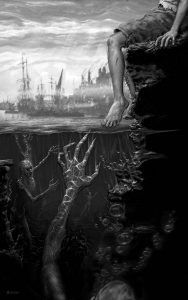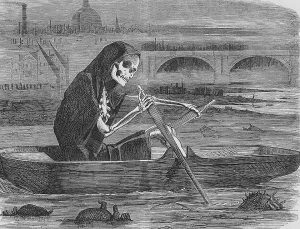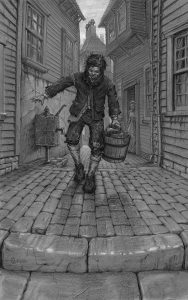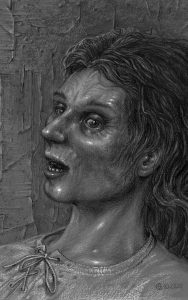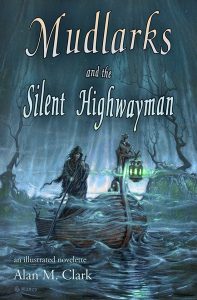Did you know that until recently, you were still able to get a ‘mudlarks’ permit for the Thames? £85 a year for an adult, no digging deeper than three inches. True!
Anyone searching the tidal Thames foreshore from Teddington to the Thames Barrier – in any way for any reason – must hold a current foreshore permit from the Port of London Authority. This includes all searching, metal detecting, ‘beachcombing’, scraping and digging.
Port of London Authority
And why do we tell you this? Because now we continue our serialisation of Alan M Clark‘s short illustrated novella Mudlarks And The Silent Highwayman, with three new segments today.
For segments 1 & 2, see http://greydogtales.com/blog/mudlarks-and-the-silent-highwayman/
MUDLARKS AND THE SILENT HIGHWAYMAN
SEGMENT 3
Albert couldn’t go home until his clothes had dried some or his mum would know he’d been in the river.
He slipped the cloth inside his shirt for safekeeping, and made his way along the foreshore. Finding himself headed south on the western edge of the Isle of Dogs, he decided to risk a quick exploration among the rushes growing near the drain for the white lead works, a good spot to check since most of the scavengers avoided the area. While much of the foreshore of the Thames offered a firm gravel or sand surface at low tide, the stretch he presently walked held pockets of deep, thick mud that made progress difficult.
Approaching the structure that supported the drain, he saw an unusual dark shape among the oversized grasses, one that he told himself was likely mere shadow. As he got close enough to see between the foliage, the doubt protecting him from unreasonable hope began to fall away. Indeed, the shape held true form and mass—he’d found the wreck of a clinker-built wherry, much like the one his father had once piloted to carry fares up and down, to and fro, along the Thames when he was a waterman.
Pushing the long leaves out of his way, Albert made out the shapes of several crates, a metal chest, and a firkin, all held fast in the mud within the boat.
Though he wanted to shout for joy, he knew better than to draw attention to the find. Instead, he stood holding his head, his heart thumping giddily in his chest. Plainly, the boat had sat unnoticed for a while, lying on its side, half-buried in the silt among the rushes. He imagined the vessel got free during recent wind storms, possibly at night while no one was watching. In his mind’s eye, he saw it wander down-stream beneath dim, flickering stars until it fetched up on the foreshore beside him.
How might he present the possible treasure trove to his mother without her knowing where it came from?
That he did not have her permission to work the river had always rankled. “It’s too dangerous,” she’d said the first time he’d brought it up. “The grundylows don’t just spread disease—they like to pull children down. You want to be the next to go missing, turn up drowned?”
Albert had told Turvey what his mother said. He’d laughed. “They’re not grundylows! They’re grindylows. The mums of all scavengers tell that tall tale to keep their children from the water’s edge.” Turvey shook his head, giggling. “You are a gulpy one.”
“I didn’t say I believed!”
“You needn’t have done. I’ve seen the way you look at the water.”
That forced Albert to reason it out. If there were such creatures drowning mudlarks, Turvey would have gone missing long ago. Albert had never seen anyone so willing to venture out into the river.
With all that, he still imagined the creatures just beneath the glare on the rippling surface whenever he dangled his legs close to the water, or while wading out into it.
Despite the childish fears, Albert was simply drawn to the water and scavenging. The possibility of finding unexpected reward held his interest like nothing else had in his short life. And ever since his father had run off, a year past, Albert had thought he should make decisions for himself about how to earn. After all, he would soon be a man.
Knowing how much Papa’s departure had hurt her, Albert didn’t want to challenge his mum or bring further grief by disappointing her, so he’d kept his activities at the river a secret.
He knew what she’d say: “You’ll be charged as a thief!”
Yet here he’d made a real find, at long last—valuable goods, gold, jewels perhaps!
Albert pried at the crates trying to get them open.
The landlord hasn’t been paid in almost a month. She knows we must take every chance to earn. Yet I must know what I’ve found before I say anything, or she’ll become cross with me. If it’s worth enough, if it’s wonderful, Mum’ll have a change of heart.
The lids to the crates were nailed down tight.
“Bloody butt and six toes,” he cursed aloud. Then, fearing that someone might have heard, he calmed himself and looked up and down the foreshore. Though he saw no one nearby, he crouched lower amidst the rushes and felt himself sink further into the mud.
He abandoned the crates in favor of the metal chest. That, he decided, was the most promising container. The thing was a foot square and half a foot deep. Trying unsuccessfully to open it, he found a keyhole and decided it was locked. That meant it indeed held something valuable. He wiped some of the grit and mud from its surface. Seeing that where exposed, the metal gleamed brightly, he stopped.
How might he keep it concealed while carrying it? He thought that heaping more mud on the chest would help disguise the shape, but anyone seeing him would know he carried a large object. Though he’d be able to lift the heavy box, he couldn’t run with it if spotted.
Likewise the crates and firkin would be heavy and stand out if he tried to carry them away. Too bad he’d lost his heavy canvas sack in the fight with the tree limb. He needed to get the containers open and find a new sack to put things in, one he could dirty up and throw over his shoulder. A shapeless thing like that—no one would suspect he carried anything of value. The only other sack he had big enough hung on a hook back at the lodgings.
With the shadows grown long, Albert knew the hour had become late. He didn’t have what he needed to open the containers and reveal his treasure, let alone haul it all away with him.
He sat back and surveyed the scene again. Resting high on the foreshore beside the drain, surrounded with dense orange rushes, and hidden within the deepening shadows, the wherry wasn’t easy to spot. With the unusual color of the plants, and a fear that the drain exhausted poisons into the river, most of the scavengers, including George Hardly, avoided the area.
The coming high tide wasn’t likely to dislodge any of the find from the mud’s tight grip, yet Albert had small hope that the wherry would remain hidden for long. Eventually, even if Hardly didn’t find it, someone on nearby Hutching’s Wharf would see the wreck and investigate, or another river scavenger unconcerned about the drain would stumble upon the site. Albert would return with a lantern to aid his salvage in the dark, but feared that would only draw attention to the find.
No, he had to go home. Mum would be in their lodgings in Narrow Street, preparing a meal with what little they had. The salvage would have to wait until morning. Hopefully, no one would stumbled upon it in the night.
Albert pulled his feet from the sucking mud. Placing them on the firmest patches of the foreshore, he made his way north toward home. One misplaced step found his left leg penetrating the muck half-way to the buttoned knee of his breeches. He wriggled and tugged it loose, and kept moving.
MUDLARKS AND THE SILENT HIGHWAYMAN
SEGMENT 4
Filthy and panting heavily in the chill autumn air, Albert arrived at the shadows under the West India Docks Pier. He was relieved to find his shoes, socks, and jacket still in the spot where he’d hidden them; a hole beneath a collapsed stone stairway that began at the base of the eroded embankment. Though his shoes had become hopelessly ragged—holes in their soles and the right one missing its heel—another scavenger would gladly take them. The leather alone could be sold to makers of Prussian-blue pigment.
Mr. Halpert, the marine store dealer, would buy almost any common item found along the river, if only for a tiny sum. He’d take anything made of metal, any type of bone, any spun or woven materials, as long as the items weren’t too rotten. Those who made fertilizer would buy items of paper, wood, or small dead animals.
Albert took the easiest route back to street-level, a steep erosion seam, worn into the crumbling bank by weather and the passage of countless others like him.
Seeing Thomas Conway standing near the cast iron bridge of the pier, Albert hid behind a stack of containers. Not wanting the bother of talking to the boy, he would wait for him to turn and look away before crossing the road.
The tow-headed child, a year younger than Albert, stood about five feet from the where the bridge met the river bank at the end of Cuba Street. Thomas craned his neck as if looking for someone. He seemed unaware that he was in the way, as a group of merchants moved around him. One of the gentlemen smacked him on the back of the head as he went by. Thomas stumbled under the blow and ran into a laborer carrying a heavy coil of cable. The man shoved the boy to one side, nearly knocking him down. The lad took the rough treatment without complaint.
New to the river banks and green, the younger boy was a nuisance. His clothing—gray woolen jacket, blue cotton shirt, brown woolen breeches, and gray socks—though worn and patched many times over, didn’t look ragged. His brown shoes had been carefully repaired with pieces of black leather. Someone looked out for the boy.
“Where’s the best place to search for valuables,” Thomas had asked on the day they’d met.
“Salvage turns up most anywhere along the river,” Albert said, with an indefinite wave toward the water. “The thing is to be the first to find it. Take care not to anger the others with prying questions.”
The advice did little good. The younger boy tried to befriend and question all the other scavengers in a similar way. He had purple bruises and a black eye after approaching George Hardly. Then, Thomas’s father, a frightening Irishman who earned writing gallows ballads, came to the river and set the scavengers straight on how his son should be treated.
Thereafter, none of the boys, nor the few girls who scavenged the river, would talk to Thomas. All, that is, except for Albert, and he made certain no one saw him speak to the lad.
When Thomas finally turned and looked away, Albert slipped from behind the containers and hurried into Cuba Street, mixing with those walking beside the warehouse to his right. He thought he’d got by unnoticed.
No such luck. “Albert!” Thomas cried. Something about his tone suggested he’d found the one he sought.
Albert stopped, looked around, saw no one of any concern watching. He walked back around to the western wall of the warehouse and faced the river as the boy approached.
Thomas held a single leaf torn from a newspaper or a magazine between two of his grubby fingers, as if he didn’t want to hold the page tightly. A breeze tried to snatch the paper away. With a grimace of reluctance, he added more fingers to his grip.
“My mother give me this. It’s from Punch. It’s old, but she says he’s still on the river, looking to nail children, and take them to the underworld.”
Albert looked at the illustration on the yellowing, wrinkled page. The engraving depicted a phantom in the form of a cloaked skeleton, rowing a boat on the river. Dead animals bobbed on the nearby surface of the water. “Looks a bit like Hardly, does he?”
“You don’t think…?” Thomas asked, his eyes wide with fear.
“No,” Albert chuckled to hear the boy take the suggestion seriously. “What are the words beneath the picture,” he asked, embarrassed to reveal he couldn’t read.
“‘The Silent Highwayman: Your Money or your Life.’” Thomas’s dirt-smudged brow furrowed with concern.
“He the ghost of a waterman?” Albert thought about his father, presumed dead.
“No, he’s not like us—never lived among us—an evil on the water, is all. Mother says he puts the bad smells in the river, the ones what make illness. Then he harvests the children as die, takes them away with him.”
That sounded something like what Mum had said about illnesses.
Albert’s father, Albert Senior or just Papa, had talked about a ferryman of the dead, named Charon. Papa’s mother, whose family had come from Greece, had filled him full of ancient Greek tales that he shared with young Albert. “Belief in Charon is very old,” he’d said. “My mum thought him mere fancy. But serving in the Royal Navy in the Mediterranean, I met some who still believe we cross over a river to reach the afterlife. Told one fellow I’d been a waterman and he looked at me like he were seeing a ghost, had no more to do with me after that.”
With his father’s dread description of the gaunt Charon, Albert had found a fear of one day meeting up with the ferryman. Since his father had abandoned the family, Albert tried not to think about the things he’d said.
Thomas’s picture of the Silent Highwayman, had resurrected the foreboding, and Albert got a chill.
Since beginning his work of mucking about in the river, he’d become ill numerous times, mostly ailments of the gut, yet he’d also had sore eyes and skin, strange rashes, and cuts on his feet, legs, and hands that had swelled with corruption and given him fevers before slowly healing. He’d succeeded in hiding most of that from Mum.
Albert looked out on the water for the Silent Highwayman, glanced around the vicinity of the pier again to make certain they weren’t watched. George Hardly stood out in the water two hundred yards away, poking around the weed and refuse caught up on the stump of a rotten dolphin.
Turning back to Thomas, Albert saw the boy’s eyes brimmed, tears glistening, ready to fall.
Is he truly so fearful?
“She doesn’t want me to work the river,” Thomas said. “I-I don’t want to believe her.”
Thomas’s mother didn’t want him working the foreshore no doubt for the same reasons Mum didn’t want Albert doing it: the risks of disease and accidents. And Thomas’s mother was trying to dissuade her son with fear, much the way Mum had tried to scare Albert. Mum knew nothing of the dangers of the likes of Hardly. Albert had told her he worked as a pure finder, collecting dog shit from the streets for the Rouel Tannery in Bermondsey.
“Do you believe he’s on the river?” Thomas asked, waving the illustration in his hand. He gave an impression he might not want the answer. “Have you heard anyone say?”
Albert wanted to point to Hardly—still poking around the rotten dolphin—and say, He’s the one you should worry about. Instead, he decided he should try having a hard heart. Thomas’s fear of the phantom might keep him off the river. “A word or two…”
Thomas’s look of concern deepened and his eyes grew wide. He let go the magazine page. The paper flipped over and lifted on the breeze, floating around the corner of the warehouse.
The younger boy turned the corner too, and ran away from the river along Cuba Street.
The page danced upward through the hazy air, flying northward. Though Albert had a chuckle watching the boy run, he didn’t like encouraging Thomas’s fear.
Mum had done the same to him, putting the grundylows in his head. Whether the fears were well-founded or pure fancy, Albert did have a feeling that something more terrible than George Hardly made sinister mischief along the river.
Occupied with his dark thoughts, he sat, donned his tattered socks and raggedy shoes, and trudged home.
MUDLARKS AND THE SILENT HIGHWAYMAN
SEGMENT 5
Mum was up and down in the night many times to use the chamber pot. Trying to sleep in the bed next to her, while full of excitement over the hope of the salvage, Albert got little rest.
In the morning, to his frustration, he found himself attending Mum in her illness.
“I am expected to deliver my collection to the Tannery’s man this morning,” he told her.
“Before you go, fetch water for me,” she said.
Seeing that they were indeed out of fresh water, Albert winced, but dutifully picked up the bucket and went out. The closest public pump was in the passage to White’s Rents. He ran there, about a quarter mile, then wobbled his way back home along the stone streets as fast as possible, trying not to spill.
Mum drank deeply of the water upon his return. “You must steady me to the privy and wait to aid my return,” she said. “I’ve become light in the head, and fear a fall.”
She remained in the crooked wooden privy behind their lodgings long enough that he might have run to the wreck of the wherry and returned. Not that that would have given him the time he needed, but the thought fed his frustration. Just as he considered making his excuses and leaving her to fend for herself, she stepped out and grasped his steadying arm.
Over the next few hours, he found no reasonable excuse to leave her without admitting his goal and revealing that he scavenged the river.
Mum was in a desperate state. He continued to fetch and tote for her through the afternoon, as she had little strength to do for herself. She moaned and writhed, complained of muscle cramps, and retched to no effect in the basin several times. When she lay back on the bed, to his alarm, he saw a rapid pulsing of the vessels in her neck.
“Shall I get someone to help?” he asked, “Aunt Gert is on my way to meet the man what pays for my findings. I could tell her to come help you.” If he got away from his mother, he might look in on his find. Aunt Gertrude lived in a room in Tooke Street on the Isle of Dogs, very close to the wrecked wherry. At the least, he could go to the marine store—not nearly as far away—and sell his half of the linen cloth he and Turvey had found.
“Your findings will not go bad. The tannery can wait. Aunt Gertrude has her own problems, and I need you.”
Albert felt ashamed of himself for trying so hard to deceive his mother.
Although he had seen Mum looking rough when ill before, he’d never feared her beauty would not return as he did presently. Her rich auburn hair was plastered to her head with perspiration, dark circles grew under her beautiful eyes, and her soft skin looked increasingly pale and gray. Albert didn’t know what to do for her. He grudgingly accepted her need to have him nearby.
Segments 6 & 7 follow in a couple of days. You can also see the full story unfolding daily here:
https://ifdpublishing.com/blog/f/mudlarks-and-the-silent-highwayman
The Mudlarks book itself, illustrated throughout by Alan, is available now on Amazon, and directly from the publisher through the links below:
mudlark ebook – ifd publishing
mudlark paperback – ifd publishing
